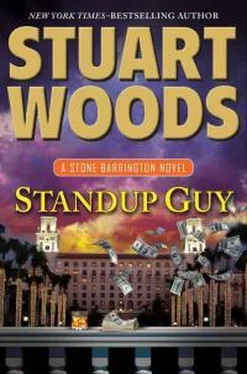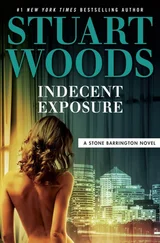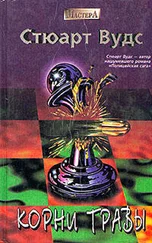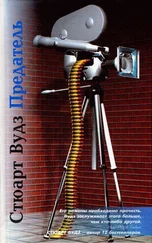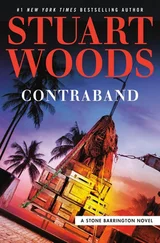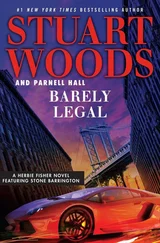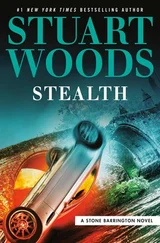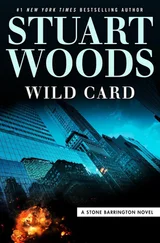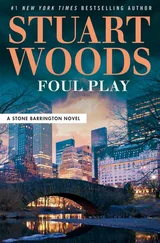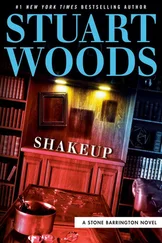“Do I really need a lawyer right now?”
“That’s my best advice.”
“But then he’ll tell me not to answer any police questions, won’t he?”
“Very possibly.”
“And if I don’t, that will make me look guilty, won’t it?”
“It’s a conundrum. The advantage lies in not having any lies on the record. If you want to answer their questions, he’ll be in the room, to keep you out of trouble.”
“All right, recommend somebody.”
“His name is Herbert Fisher. He’s with my firm, Woodman & Weld. He’s young, smart, and shrewd.”
“All right, Herbert Fisher.”
“He’s called Herb.” He gave her the number.
“I’ll call him.”
“Do that.”
They both hung up. Stone was still confused, but there was enough in her answers to keep him believing that she had not killed Buono.
45
Jack Coulter was in the Breakers’ gym, working out, as he had done every day in prison, except he did not now use weights to achieve bulk. He glanced at the mirrored wall and was pleased to see himself as a well-built, fit forty-year-old. He had had his suits altered twice to adapt to his decreasing weight.
His cell phone rang on the stool beside him, and he picked it up. “Yes?”
“Who is this?” A male voice, deep, raspy.
Jack hung up and waited. The phone rang again. “Yes?”
“I’m sorry, this is Will Crowder. Are you expecting my call?”
“Yes.”
“Manny Millman said—”
“Stop. Report.”
“Yes, sir. The subject, Harry M. Moss, is a sixty-one-year-old white male, five-nine, one-sixty, in apparently good health. He retired from the FBI at fifty-nine and lives on his pension, plus benefits from an inheritance.”
“What benefits?”
“His mother married twice. Her first husband, Martin Moss, was a carpet salesman for a big furniture store in New York. He died of a heart attack at fifty-four. Her second husband, William Hood, was the owner of the big furniture store. Not long after their marriage, he retired at the age of sixty-nine and sold the business. They moved to Delray Beach, Florida, to a beachfront condominium in a building constructed in the 1920s. He proceeded to gamble away much of his capital, and he shot himself at the age of seventy-two, on the beach in front of their building late at night. Mrs. Hood continued to live in the apartment until her death, three years ago, in much-reduced circumstances. She left her son, Harry, the apartment and enough in a trust to pay the maintenance, taxes, and fees on the apartment, but not much else.
“There was some considerable feeling in local law enforcement that Mrs. Hood murdered her husband, her motive being to conserve what was left in his estate before he threw it all away. The theory of the case is that the two of them went for a walk on the beach after midnight, and that she took along a .32 caliber revolver belonging to her husband that he kept in a bedside drawer, that she shot him in the right temple, knowing that he was right-handed, wiped the gun, put his fingerprints on it, and left it in the sand next to his body. She returned to her apartment via a service elevator, which was very little used at night, then went to bed and waited for someone to come to the door and inform her of her husband’s suicide. She was awakened by the police around eight AM the following morning, roused from a sound sleep, she maintained, after the discovery of Mr. Hood’s body by a maintenance worker who had come to rake the beach.
“Repeated interrogations failed to shake her story—that she had gone to bed at her usual hour of eleven, and that her husband must have taken a late walk after that time, then, depressed by his financial woes, taken his own life. The case was closed after a coroner’s inquest ruled Hood’s death a suicide.
“Moss lives entirely on his pension, as he had saved little, and he is not yet old enough to collect Social Security. He has listed the apartment with a local firm, naming a price of three million nine hundred and fifty thousand. He probably hopes to realize three and a half million. It has been on the market for fifteen months with two offers of less than two mil. He blames local market conditions following the recession. He drives a two-year-old Toyota Camry Hybrid and frequents the five-dollar window at Hialeah racetrack, wins some, loses some.
“Contact with a close acquaintance says that he does little with his time other than hang out at a local coffee shop and the public library in the daytime and a local bar in the evenings, watching sports on TV and trying to pick up women, almost always unsuccessfully. His attitude toward life is one of being thwarted—especially by his stepfather’s gambling habit. He feels that, if not for that, he would be a wealthy man today, driving an expensive car, dressing well, and having sex with beautiful women.
“His defining characteristic is that he is always looking for a windfall that will restore him to that position, but he seems unlikely ever to achieve that.
“That concludes my report. Do you have any questions?”
“No.” Jack hung up.
• • •
Will Crowder stared at the phone in his hand as if to rebuke it. He had no idea whom he had been talking to and no idea why. He called Manny Millman.
“Yes?”
“It’s Will Crowder. I’ve made my report. Your friend seemed satisfied.”
“Good. Your debt is canceled. I’ll have your three grand for you this afternoon at the track. Come see me.” He hung up.
46
Herbie Fisher sat in his office, cradled by his Eames lounge chair, reading a letter for his signature. His secretary buzzed. “Yes?”
“Stone Barrington for you.”
He pressed the SPEAKER button. “Stone?”
“How are you, Herb?”
He had trained Stone not to call him Herbie anymore. “I’m just great, thanks. You?”
“So-so.”
“That doesn’t sound good.”
“I just got off with a friend who may be in trouble.”
“Anybody I know?”
“Her name is Henrietta Cromwell, calls herself Hank.”
“Does she look like a Hank?”
“Not a bit.”
“Anything I can do to help?”
“I’d appreciate it if you’d see her, talk to her. If you can help, please do.”
“What’s her number?” Herbie saw the light on his second line flashing. “She may be calling now. Hang on.” He buzzed his secretary. “If someone called Hank Cromwell calls, get her in here.” He went back to line one. “Okay, give me some background.”
Stone started with his meeting Hank at Clarke’s, then took him, step by step, through everything that had happened.
“All right,” Herbie said, “I think I get the picture. Do you have an opinion about this?”
“I’d rather let you form your own after you see her.”
“There is the possibility, as I see it, that after you left the lake cottage with Hank, Buono could have returned to the lake and been murdered by somebody else—either someone who came with him or someone who knew where he was and came after him.”
“I think that’s her way out of this.”
“Is she a truthful person?”
“I’ve caught her in only one lie, about the protective order. Everything else could be true, or she could be lying about all of it.”
“Well, you’ve certainly made my day more interesting. Maybe we’ll talk again after I’ve seen her.”
“I think you’ll make better decisions if I don’t contribute to them.”
“As you wish. See you.”
They both hung up.
His secretary was standing in the door. He signed the letter and handed it to her.
“ Ms. Hank Cromwell will be here in a few minutes,” she said.
“When she arrives, show her straight in.”
Читать дальше
